Congratulations on making a wonderful choice for the animals, this planet, and your health! Going vegan can actually be a piece of cake — especially with this complete beginner’s guide.
Learn what being vegan actually means and which areas of life it entails, find handy grocery lists to stock your plant-based kitchen and other free printables!
We’ve included lots of beginner-friendly and crowd-pleasing vegan recipes for any occasion and preference to show you that it’s absolutely possible to go and stay vegan for good.
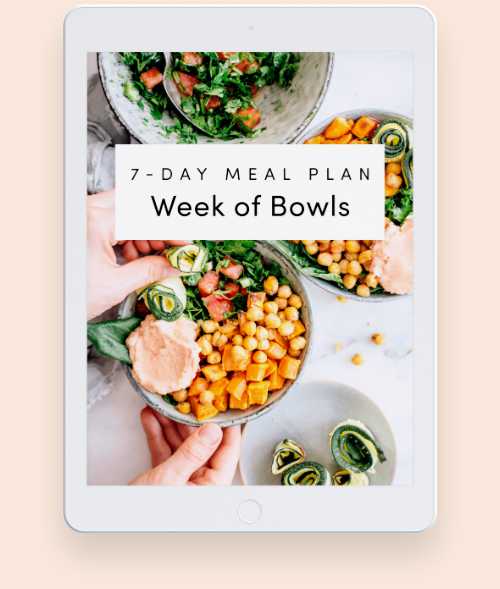
free 7-day vegan meal plan
Your next week of eating is planned out with these quick and delicious vegan bowls, meal prepping steps & full grocery list.
Definition & benefits
Let’s start with the basics. What exactly does “vegan” mean and why is it a good idea to go vegan in the first place?
What is vegan?
You often see the terms “vegan” and “plant-based” thrown around interchangeably. But they are not actually the same thing!
Let us explain.
Veganism is more than just a diet, it’s a lifestyle and a philosophy. In the words of The Vegan Society, the official definition is as follows:
“Veganism is a philosophy and way of living which seeks to exclude—as far as is possible and practicable—all forms of exploitation of, and cruelty to, animals for food, clothing or any other purpose.”
While vegetarians only abstain from meat, fish, and gelatine (products of the actual dead animal), vegans also cut out all animal by-products and even apply their philosophy to other areas of life.
Reasons for going vegan
Knowing and remembering why you want to go and stay vegan is very important, especially at the beginning of your journey.
Since veganism is an ethical standpoint, the main reason to follow this lifestyle is to reduce animal suffering as much as possible. Even though there’s no such thing as a 100% cruelty-free life, we can still aim for harm reduction!
Other benefits of veganism include:
- Lower environmental footprint
- Lower rates of heart disease & type 2 diabetes
- Less water & air pollution
- Plant-based diets can feed more people
- Supports a healthy weight
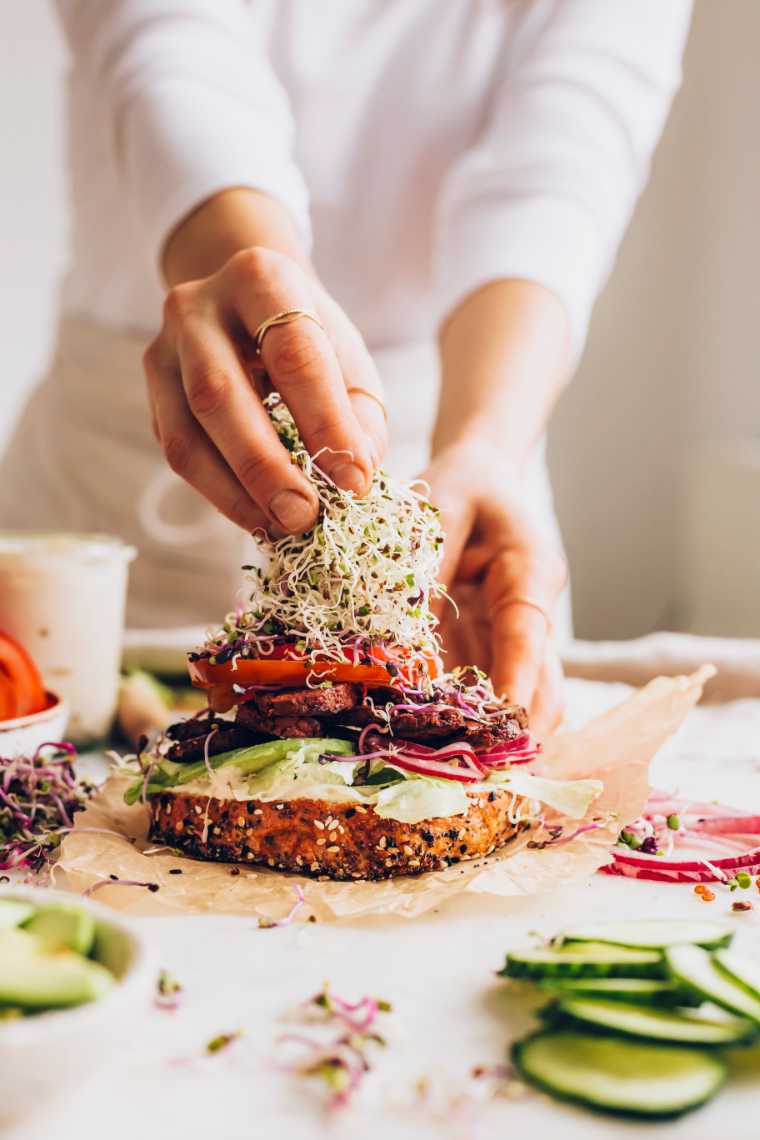
Vegan food
What can vegans eat
Simply put, vegans eat everything from the plant kingdom, and there’s a vegan version for any food or meal you can imagine. That doesn’t sound very restrictive, right?
Here’s an overview of what vegans can eat:
- Fruits & veggies
- Grains like bread, pasta, or porridge
- Beans & lentils
- Nuts & seeds
- Dairy alternatives
- Mock meats
What vegans can’t eat
Vegans choose not to eat anything that causes animal suffering. This includes food that is derived from an animal, and some people might not think would harm anyone — like honey.
- Meat
- Poultry
- Fish
- Seafood
- Milk
- Butter
- Yogurt
- Cheese
- Eggs
Find a list of common names used for animal-derived ingredients below in this article!
What Vegans Can’t Eat →Vegan beverages
Many beverages are vegan, while others are not. Swapping cow’s milk in your coffee for almond milk is an obvious one, but did you know that some fruit juices and alcoholic beverages aren’t vegan?
They can be filtered with fish gelatin or isinglass or colored with various animal by-products.
You can either look for a vegan label if you’re unsure or check out the website Barnivore for vegan-friendly alcohol.
In terms of water, coffee beans, or herbal tea, you’re good to go!
Grocery shopping
Make grocery shopping as a new vegan a lot more fun with our ultimate vegan grocery list!
You can find every single item that’s totally vegan-approved and might be at your local store.
Cross off what you already have at home, circle what you want to get the next time, and modify it to your needs.
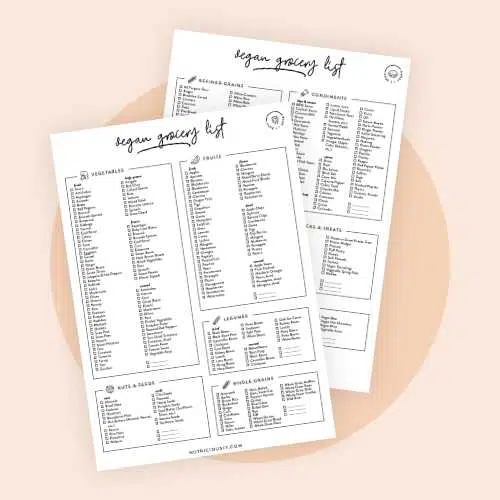
download our free printable vegan grocery list
Grab your free PDF and sign up for our newsletter by entering your email below!
Reading labels
Since we cannot tell you exactly which item to get and if it’s vegan or not, we want to equip you with the knowledge of checking for yourself to see whether or not it’s vegan-approved.
Quite a few items at the store feature some type of vegan label nowadays — there are a few official labels and some that have been put there by the producers themselves.
There are also apps that you can use by scanning a code or searching for products and ingredients.
When reading labels yourself, here are some ingredients to look out for which symbolize that the product in question is not vegan:
- Ghee
- Gelatine
- Royal jelly
- Whey
- Casein
- Rennet
- Lactose
- Collagen
For a full and regularly updated list, check out this page by PETA.
Vegan Ingredients Checker →Vegan substitutions
Eating a plant-based diet isn’t about restricting, it’s about smart food swaps! Here are vegan replacement ideas and brands for the most common animal products.
Vegan meat
- Beyond Meat
- Tofurky
- MorningStar Farms
- Gardein
- Field Roast
- Lightlife
- Quorn
Vegan cheese
- Daiya
- Miyoko’s
- Follow Your Heart
- Violife
- Simply V
- Vegan cheese recipes
Vegan egg replacements
- Just Egg
- Follow Your Heart
- Silken tofu (for scrambles)
- Kala Namak (black salt with a sulphur taste)
- Flax “egg” (flaxseeds + water)
- Chickpea flour (for omelettes)
- Aquafaba (chickpea liquid used for baking)
- Smashed banana or avocado (for baking)
Honey replacements
- Bee Free Honey
- Humble Honee
- Harmless Hunny
- Maple syrup
- Agave syrup
- Rice syrup
- Molasses
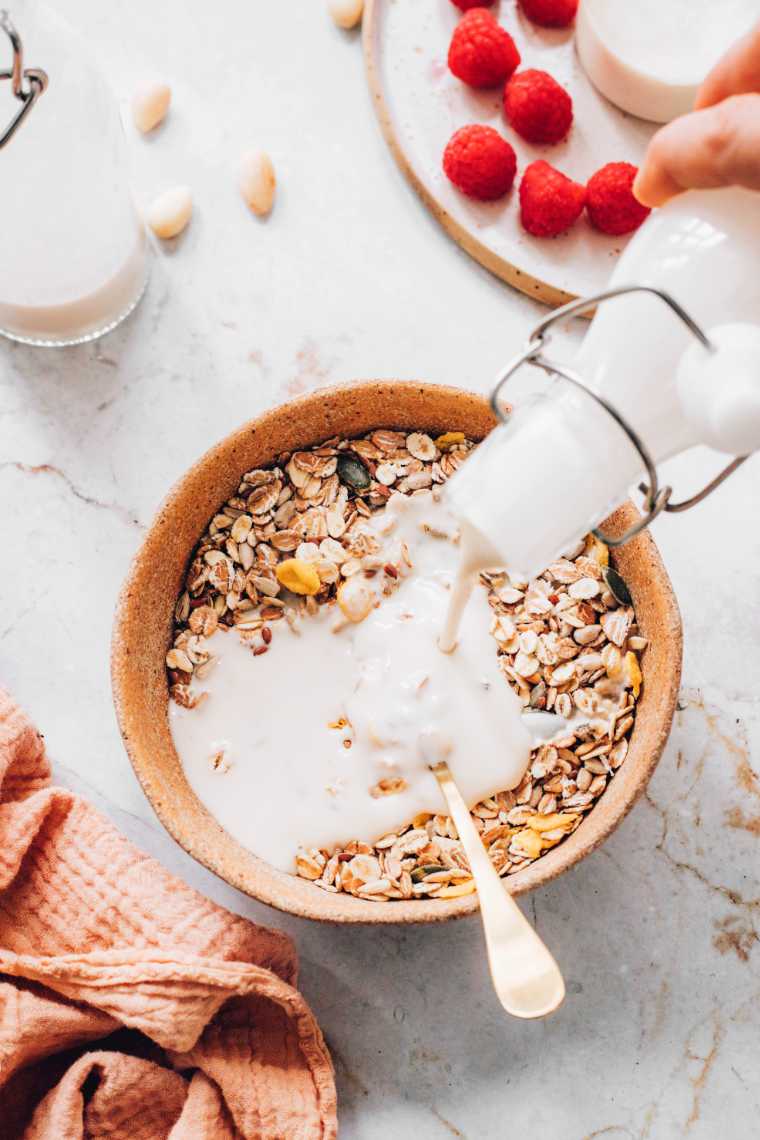
Vegan lifestyle products
Clothing & apparel
No need to look for vegan-certified t-shirts or anything! While it’s more and more common that items like shoes are certified vegan (which even entails the glue they use!), just avoid the most common animal-derived materials such as:
- Leather
- Wool
- Silk
- Fur
- Cashmere
- Chiffon
- Down
- Suede
- Felt
- Satin
Many everyday clothing items are already vegan-approved but especially when it comes to shoes, jackets, belts and warm sweaters, you should try to look for vegan alternatives to wool, leather, etc.

Personal care & cleaning
Some makeup, personal care, or household cleaning products can contain animal-derived ingredients or have been tested on animals.
If you want to avoid as much cruelty to animals as possible in this area of life, you can look for some kind of vegan label on the front or back of any specific product.
Most of the time, reading ingredient lists is too complicated and cryptic — also, they don’t tell you whether the product was tested on animals.
Common vegan-approved brands are:
- Pacifica
- Mrs. Meyer’s
- Ecover
- Method
- Wilko
- Alba Botanica
- Principle Beauty
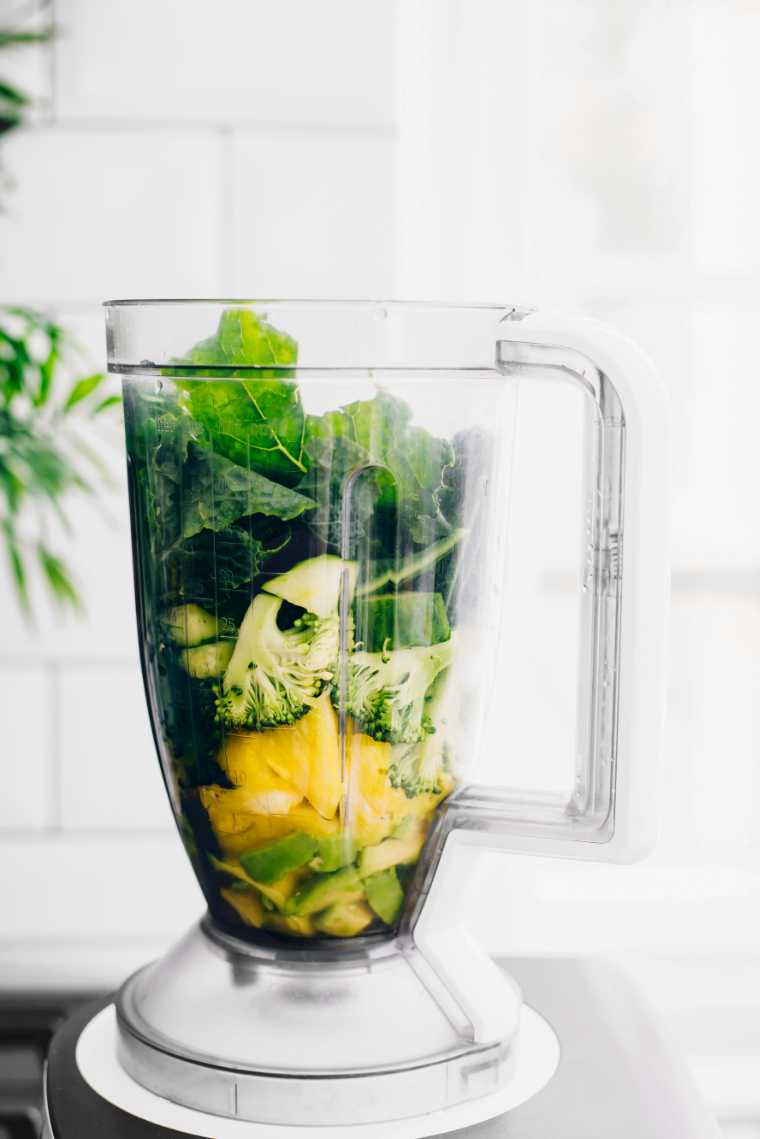
Vegan nutrition 101
Do all vegans suffer from malnutrition? How difficult is it to replace the nutrients people usually get from animal products, and are supplements necessary?
Let’s go over the basics of what you need to know when going vegan and what’s more important down the line.
Where do you get your protein?
There’s probably no vegan on planet Earth who hasn’t been asked this question — so let’s cover this one first.
Vegans get their protein from plants. Surprised? Yes, there are plants that have essential amino acids, and eating a wide array of them ensures that we meet all of our needs.
Common vegan protein sources
- Beans
- Lentils
- Tofu & soy products
- Seitan
- Quinoa
- Oats
- Nuts
- Protein powder
And in case you’re wondering: no, soy is not bad for you!
Plant-Based Protein Guide →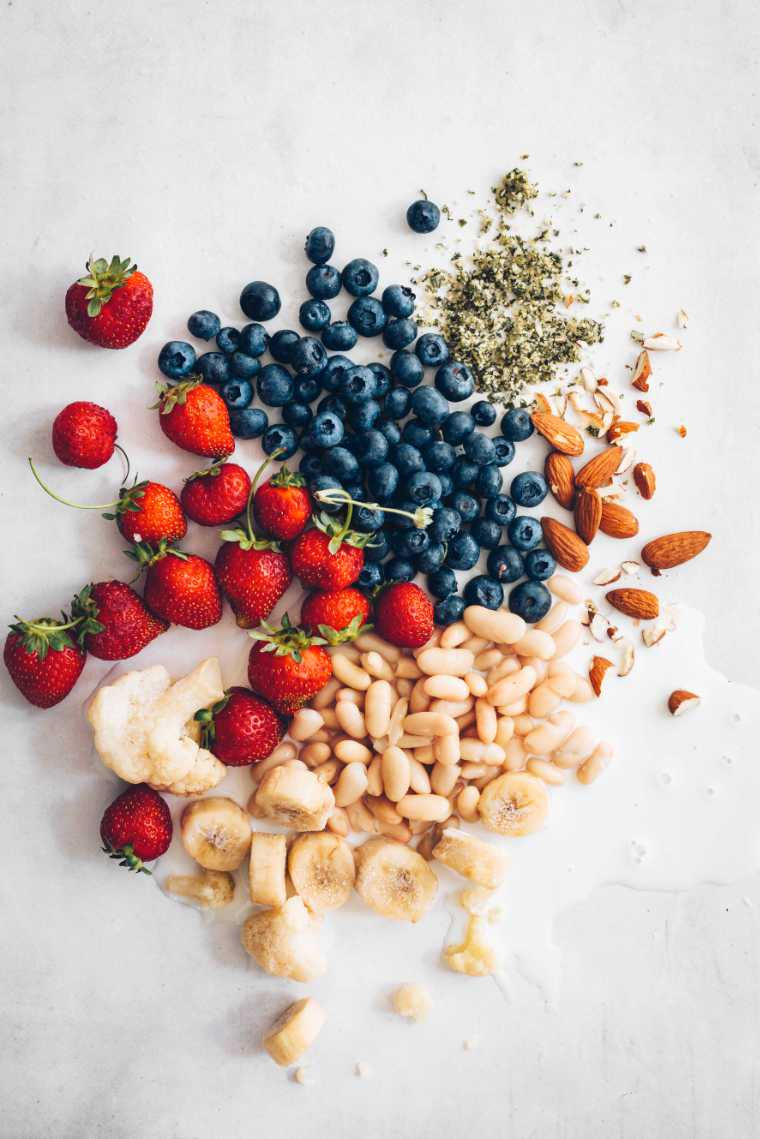
What supplements to take
Almost all of the essential nutrients can be obtained by eating plant-based foods. However, you might fall a little short on some!
The exception to this rule is vitamin B12. This is the one supplement that every vegan needs to take! Luckily, it’s easy to find and really cheap — plus, vegetarians and older adults should also supplement with B12.
More and more vegan products are fortified with this nutrient, but it’s better to err on the side of caution!
Some people might also need to supplement vitamin D, omega-3, iron, and iodine. This is highly individual, though, and you should get a blood test done first.
Check out our full article on vitamin B12 on a vegan diet here!
Nutrients to look out for
Some nutrients are a bit harder to find on a plant-based diet than others. While it’s easy to eat enough vitamin C and fiber as a vegan and keep your saturated fat intake low (something meat eaters can struggle with), here are some nutrients to look out for on a fully plant-based diet.
- Calcium: green vegetables, oranges, tahini, calcium-fortified soy milk, and tofu
- Iron: oats, spinach, dried figs, lentils, tahini, chickpeas
- Zinc: whole grains, chickpeas, lentils, tofu, pumpkin seeds, almonds
- Iodine: nori or dulse seaweed, iodized salt, supplement
- Omega-3: flax seeds, chia seeds, hemp seeds, walnuts, algae oil supplement
- Vitamin D: sun exposure, some UV-light grown mushrooms, supplement
- Vitamin B12: supplements, fortified foods
For more information and free downloads, check out our in-depth vegan nutrition guide!
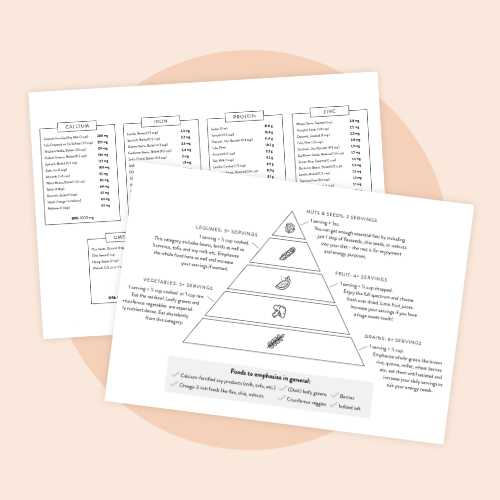
download our free vegan nutrition printables
Grab your free PDF and sign up for our newsletter by entering your email below!
Weight loss on a vegan diet
If you’re looking to lose weight on a vegan diet, you’re in luck! Plant-based eating patterns are associated with lower average BMIs and are oftentimes easy to maintain long-term, meaning you won’t end up gaining back all of the weight.
A plant-based diet typically focuses on fiber-rich and lower-calorie foods, which gives you the perfect foundation for successfully managing your weight.
Check out the following resources for more!
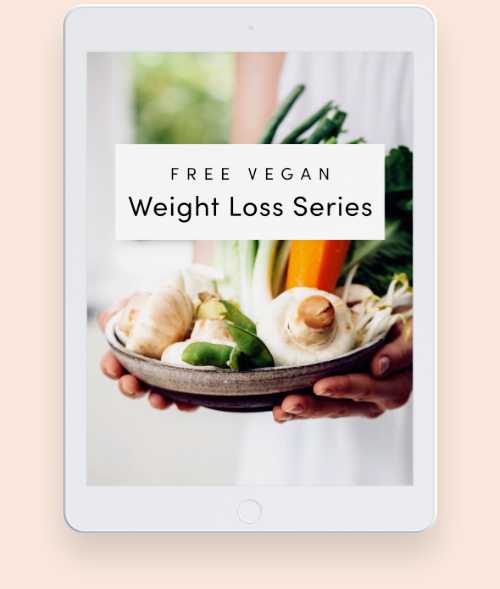
free weight loss email series
Getting lean while feeling full? Yes, that’s possible! Find out about easy food swaps, calorie density and 3 full days of eating for sustainable weight loss.
Vegan recipes
Let’s talk about the fun part: delicious eats! If this aspect has you worried because you think that preparing vegan food is hard or that it might not taste great, let us convince you otherwise.
Browse the following collections to choose your very first vegan recipes to prepare for yourself or even your whole family!
Easy recipes by type
Going vegan: the first steps
How do you get started on a vegan diet if the points we just mentioned have made you curious? Here are our top tips.
Take it slowly
Most of us have an easier time changing our habits if we do it step by step. You can start by adding new foods to your diet and “crowding out” animal products.
No need to remove anything at first — or simply start with those foods that are easiest for you to omit or replace.
Go over the non-vegan foods in your kitchen and think of replacements: try soy milk instead of cow’s milk, veggie burgers instead of beef burgers, and margarine instead of butter.
If you have been eating an omnivorous diet up until now, you can decide to cut out meat first, then go dairy-free, and so on.
Find our favorite vegan food swaps here!
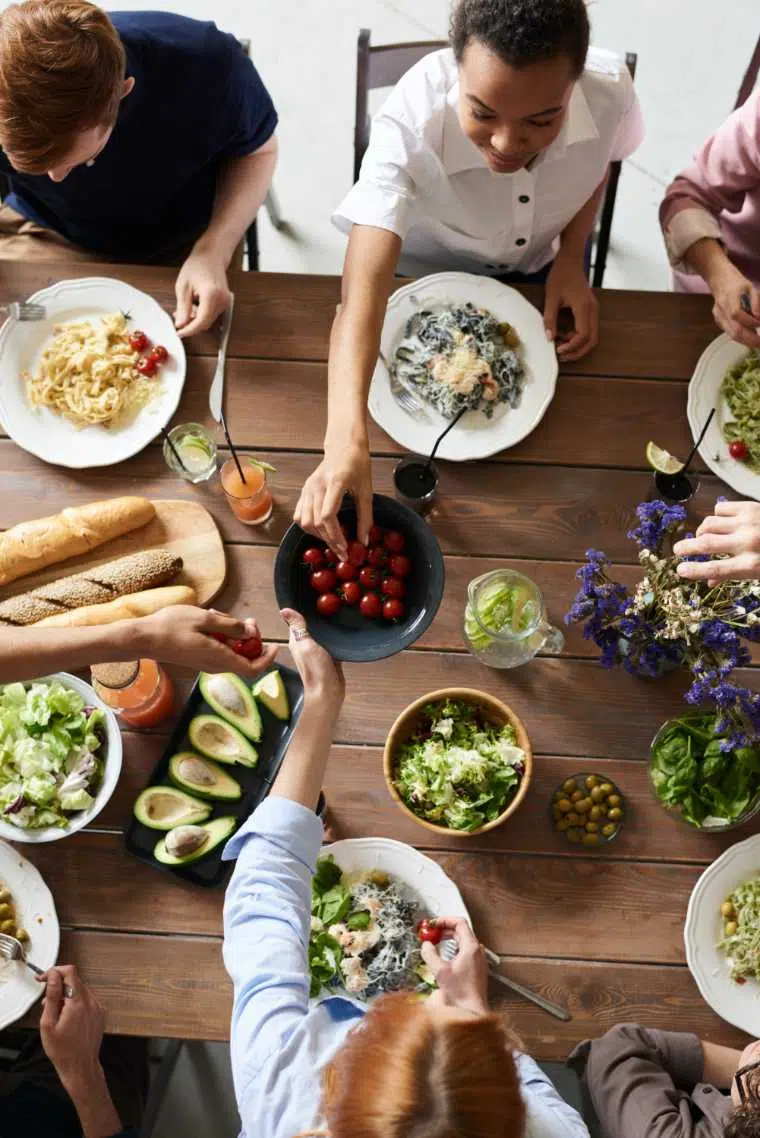
Let go of perfectionism
No matter your transition type, everyone will come across some mishaps during their vegan lifestyle. It happens to us after years and years!
Waiters may mess up your order, grandma forgot to use margarine instead of butter when she was baking you a cake or you went shopping in a hurry and reached for the wrong product.
It doesn’t mean at all that you’re not vegan anymore if that happens! Don’t get caught up in perfectionism or diet mentality and simply aim to pay better attention next time.
Even if you slip up intentionally and reach for that slice of cake that contains animal products, it just means that you still need to find good replacements or connect with the ethical reasons for veganism a bit more.
Abandoning a vegan lifestyle altogether because of that won’t help a single animal!
Start with breakfast
If making three plant-based meals a day is too overwhelming right now, why not start by making vegan breakfast?
It’s perhaps the easiest one to veganize, and you don’t have to get the whole family on board. Here are some options:
Check out our vegan breakfast guide as well as the two recipe collections below for more ideas!
Choose a few good recipes
Nobody asks you to come up with a whole new dinner idea every day of the year from now on! Most people usually have the same 6-8 dishes in their rotation to feed themselves and their families.
This means that having a few basic plant-based recipes you actually like on hand gets you pretty far already!
Some of our favorites include:
- Stuffed bell peppers
- Vegan pesto pasta
- Easy veggie stir fry
- One-pot lentil soup
- White sauce pasta
- Mushroom risotto
- Vegan mac and cheese
- Hearty bean chili
Connect with other vegans
No need to feel lonely and like the whole world is against you as a vegan! The number of vegans worldwide is growing daily and luckily, we have the internet to connect with each other.
From Facebook groups (feel free to join ours here!) and communities on other platforms or Meetup, you can probably find vegans somewhere in your area, too.
Educate yourself
Although going vegan is no rocket science, it makes sense to watch a few vegan documentaries and YouTube videos or read a book about this subject.
This greatly helps when you love motivation, too!
Knowing the basics about plant-based nutrition and supplementation is also crucial to stay vegan long-term. Find our favorite vegan resources below!
Join our free vegan course
If you’d appreciate a detailed plan for going vegan and how to tackle different areas of your life, we can take you by the hand and walk you through the first steps!
Our free vegan transition course covers everything from stocking your kitchen to shopping, nutrients, meal planning and having conversations with others about your new lifestyle.
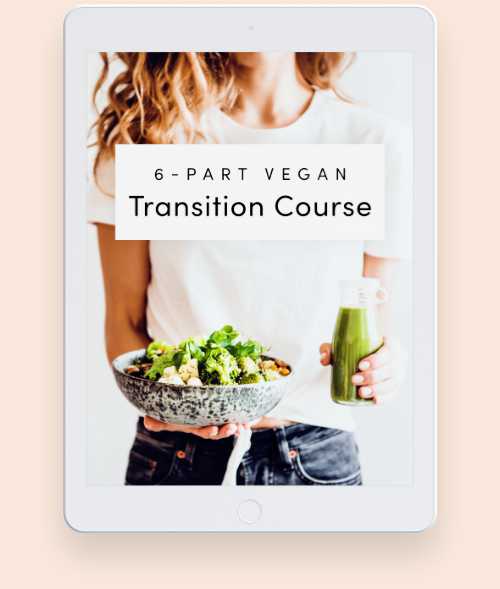
join our free vegan course!
Learn how to thrive on a plant-based diet with practical tips & a 3-day meal plan!
Vegan lifestyle tips
For some people, eating only plant-based foods isn’t the hardest part about going vegan — it’s their social life.
Here’s how to avoid feeling left out, tips for conversations, living with non-vegans and much more.
Vegan family tips
Do you want to transition to a vegan lifestyle on your own or get your family on board? Lots of variables appear when you ask this question.
It largely depends on whether or not your partner is supportive of your lifestyle choice and agrees to eat plant-based with you at home, whether you’re the one doing most of the cooking and shopping or whether you’re a teenager and don’t have a lot of say in the family at all.
Find valuable tips for your specific situation in the following articles:
Vegan restaurants & eating out
As we’ve established above, the first few actionable steps when going vegan is to buy only vegan-approved products and consume them at home. Easy done!
But what if you are outside of your own home, say at a party, traveling or at a restaurant?
Depending on your level of confidence, you might decide to eat vegan food only at home for the first few weeks. During this time, you could order the vegetarian option whenever you’re out which will be easy to find anywhere.
If you don’t happen to live in New York or London, finding plant-based dishes at random places can be a bit tricky! Here are some tips.
- Check the menu for a little (v) next to the dishes
- Browse the sides instead of mains to see if you can create a little menu
- Take a look at the menu online before you go to make a plan
- Ask the waiter whether butter or oil is used in certain dishes
- Tell the waiter you’re vegan and ask whether they can accommodate you (this is great for spreading awareness of veganism!)
Find the best vegan-friendly restaurants all around the world by using the free app HappyCow and ask your friends whether you can check some of them out together!
Best Vegan Fast Food Choices →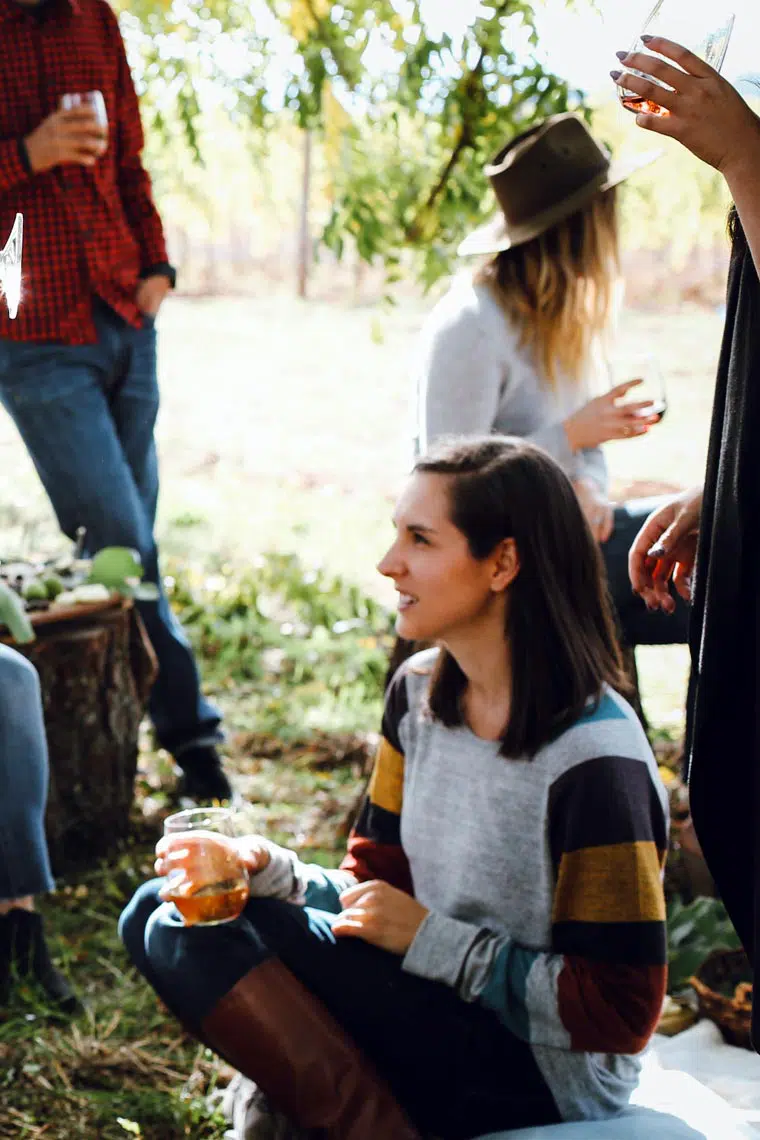
Being vegan around the holidays
This time of year is usually the trickiest for aspiring vegans! Cookies, meat and other animal products are front and center during the holiday season, so how the heck can you navigate through all of this?
After 10 years of being vegan ourselves, we know many of the ins and outs of holiday meals, gifts and dealing with family gatherings.
Check out our helpful guides below for more!
- Vegan Holiday Survival Guide
- Vegan Christmas Dinner Recipes
- Vegan Thanksgiving Recipes
- Vegan Easter Recipes
- 20+ Stocking Stuffers
Vegan BBQ & cookouts
The other time of year when meat plays a huge part in many people’s lives is during BBQ season.
Apart from trying all of the different mock meats from the store and voting for a potluck-style cookout where you can bring your own vegan food, there are some helpful tips in our guide below — including lots of recipes, of course.
Resources & education
Dive deeper into the reasons behind veganism, plant-based nutrition, and everyday lifestyle tips by browsing our list of fun, approachable and educational resources — using the medium of your choice.
Best books & cookbooks
- How Not to Die by Dr. Michael Greger
- Becoming Vegan by Brenda Davis, RD
- Proteinaholic by Dr. Garth Davis
- 5-Ingredient Whole-Food, Plant-Based Cookbook
- Animal Liberation by Peter Singer
- Vegan for Life by Jack Norris, RD & Virginia Messina, RD
Documentaries
- What The Health
- Cowspiracy
- Speciesism
- Land Of Hope And Glory
- Forks Over Knives
- The Game Changers
Our favorite vegan blogs
- The Simple Veganista
- Running on Real Food
- Pick Up Limes
- Emilie Eats
- Sweet Simple Vegan
- The Full Helping
- The Minimalist Vegan
- Lazy Cat Kitchen
- The Vegan RD
Obviously, there are so many more great vegan blogs, this is just a starting point.
Best vegan podcasts & Youtubers
One more section with great vegan resources that you can listen to (and watch)! It’d be way too hard to pick favorites here, so go check out our full lists below or go directly to these vegan speeches.
More articles
- How to transition to a vegan diet
- 7-day vegan challenge
- How to start a plant-based diet
- How to cook vegan
- What I eat in a day (vegan)
Did you enjoy our article about going vegan for beginners? Let us know in the comments below, share it with your friends and Pin this guide here.

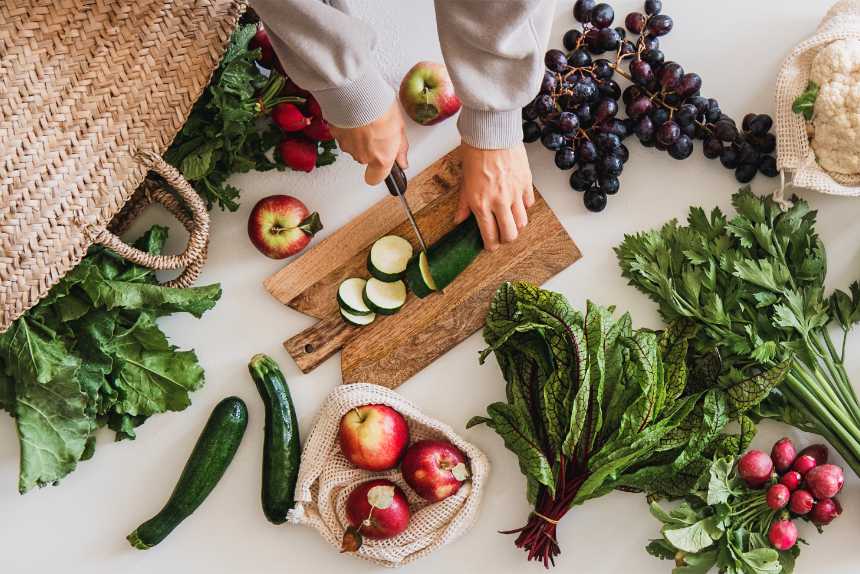
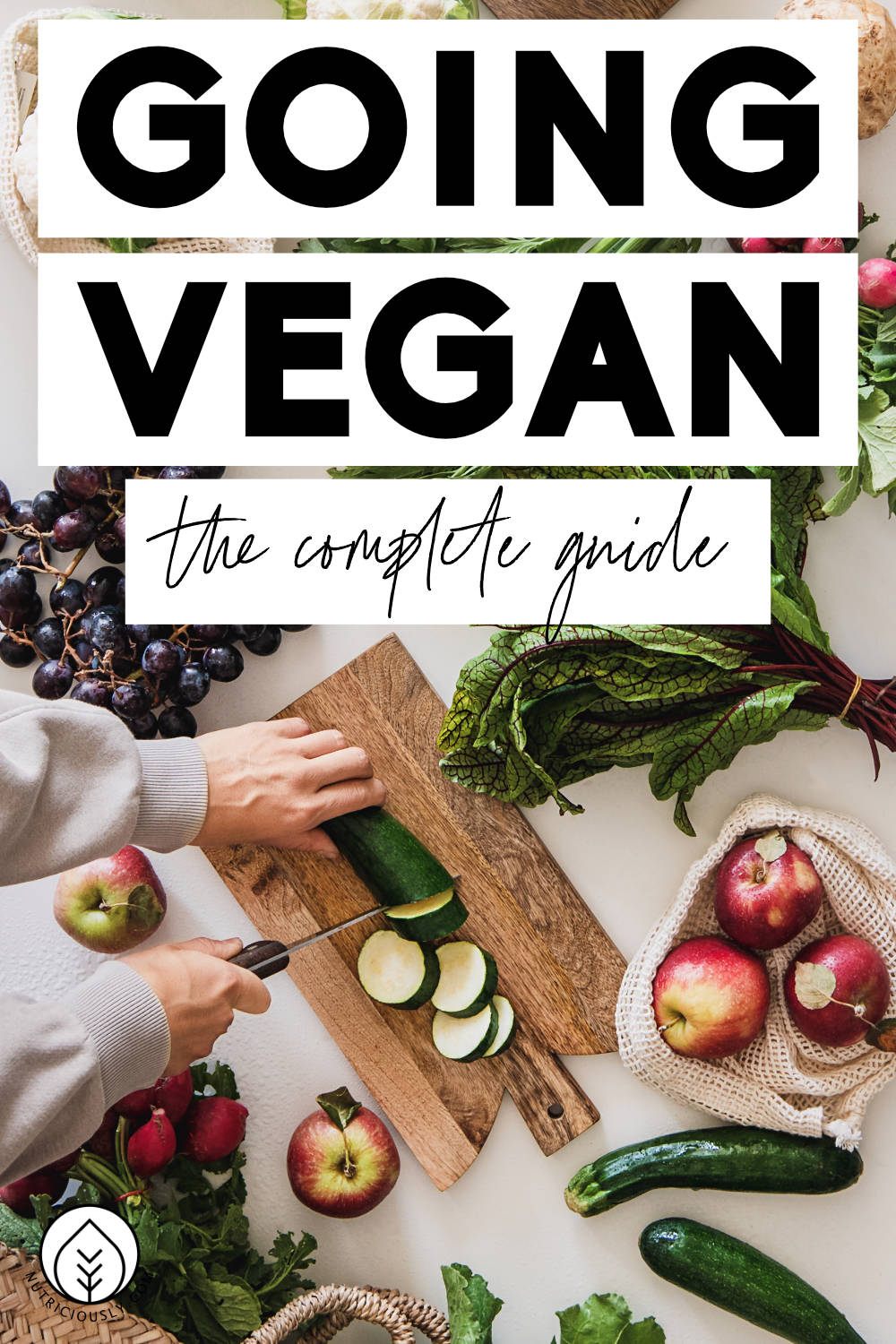
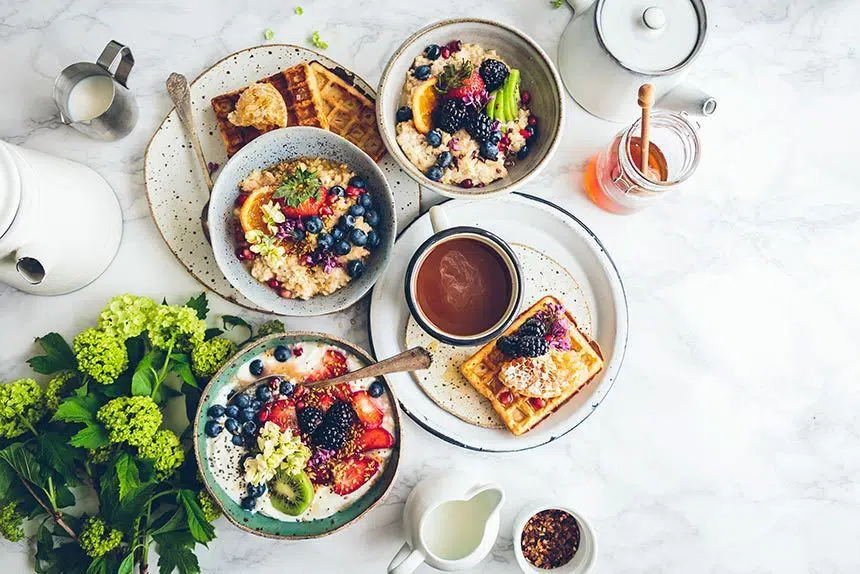
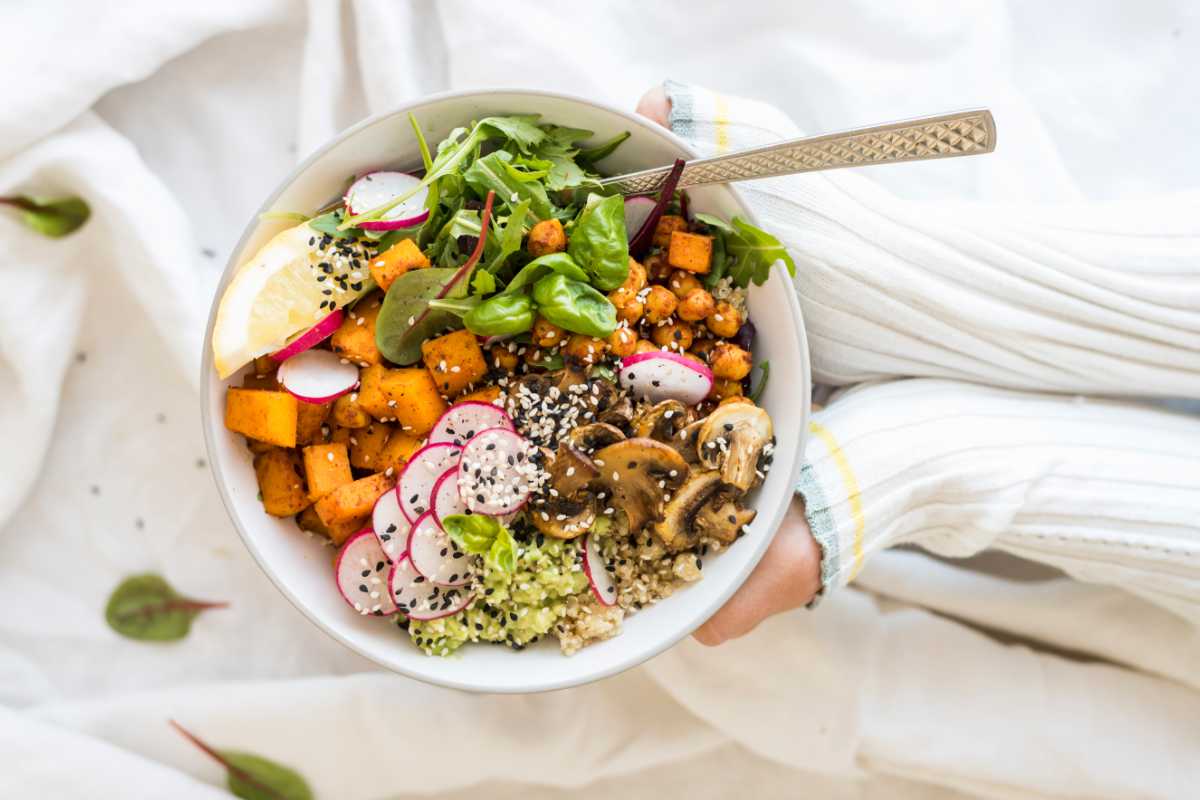
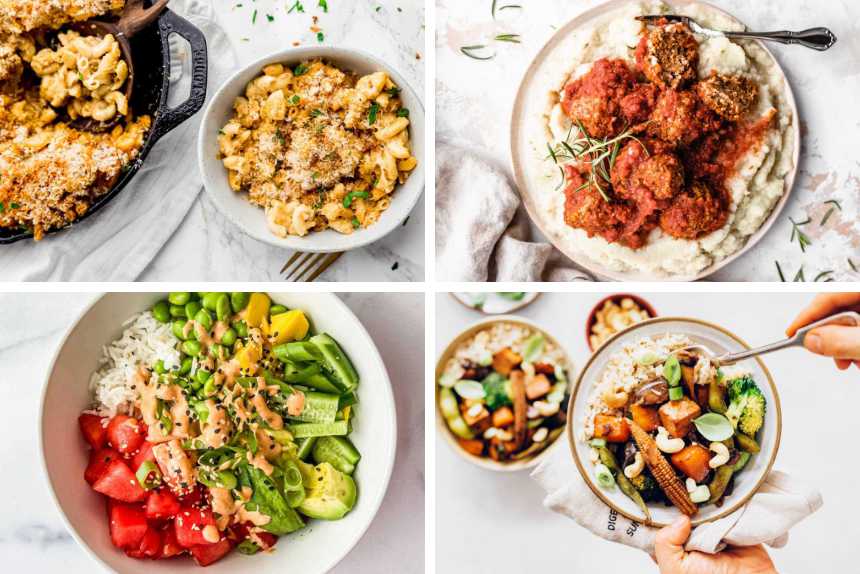
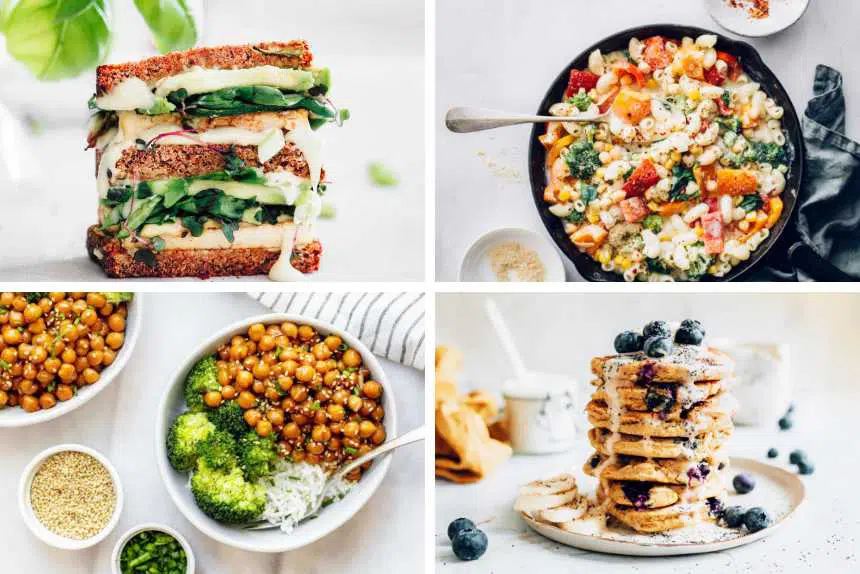
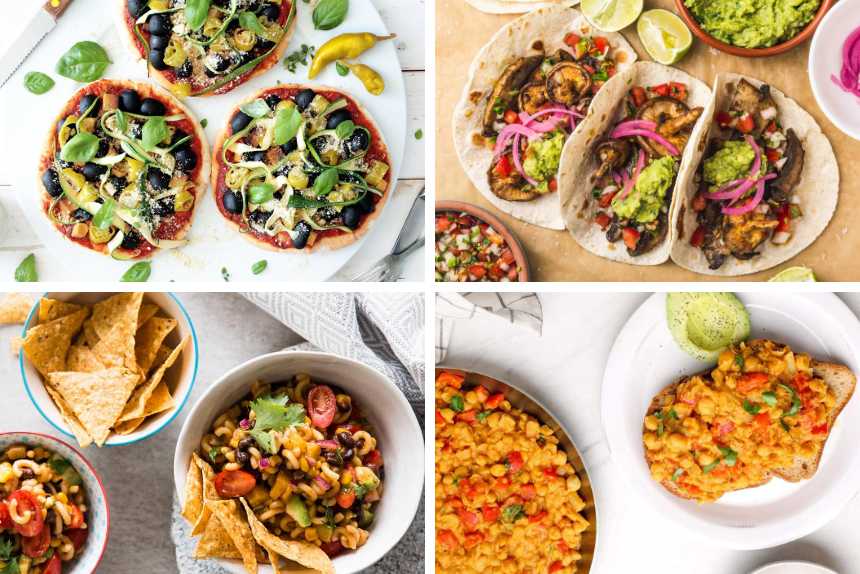
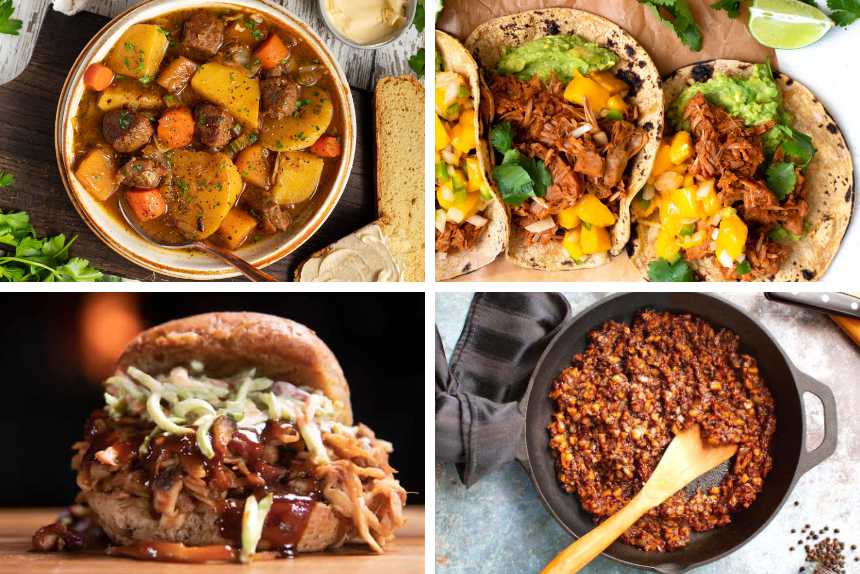
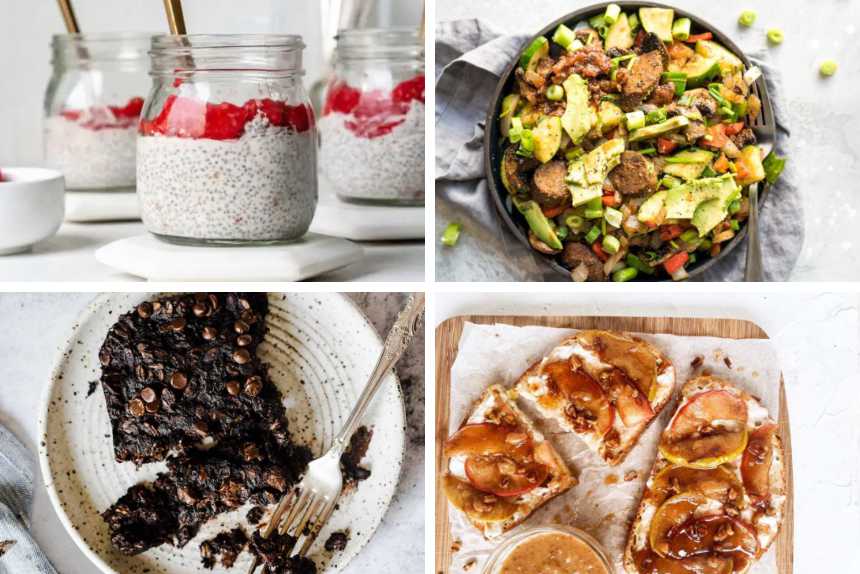
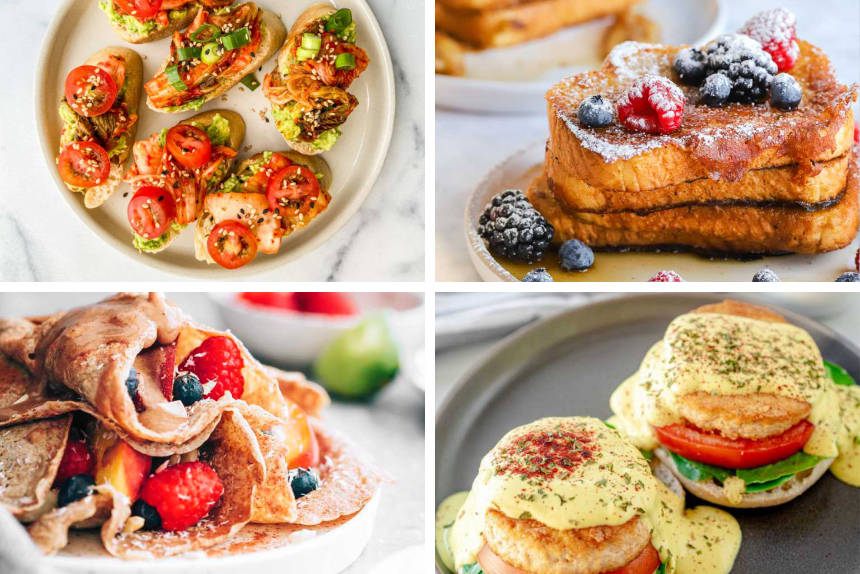
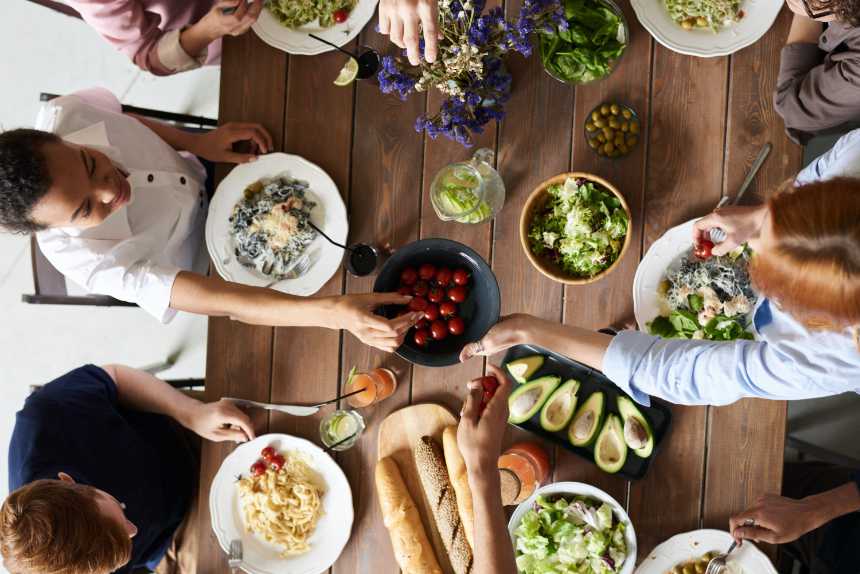
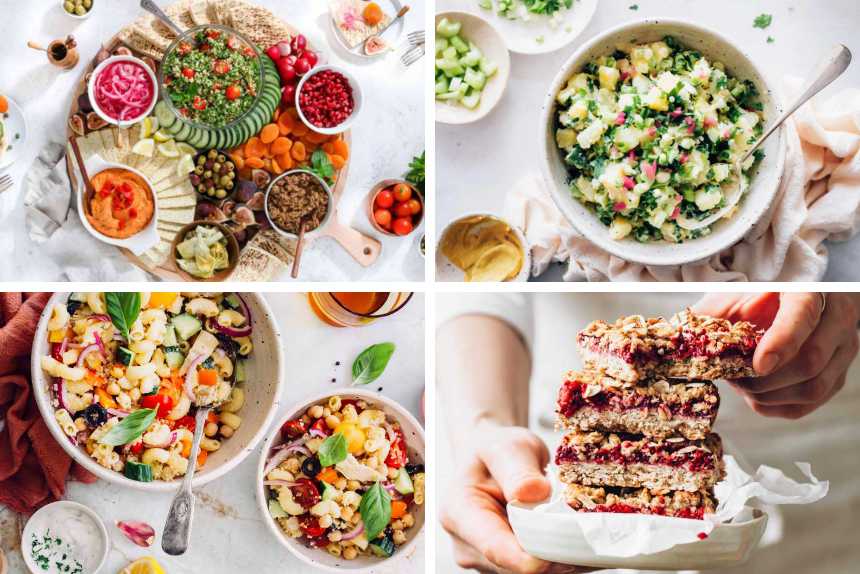
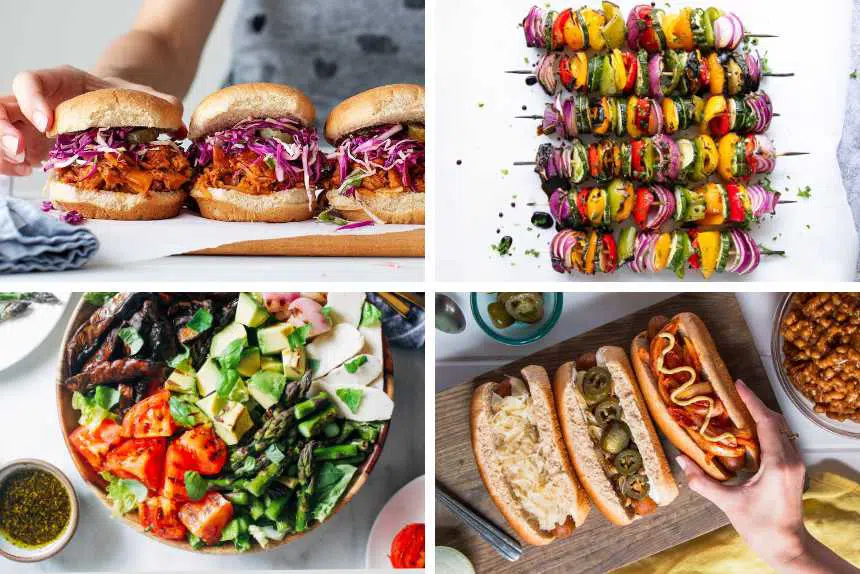
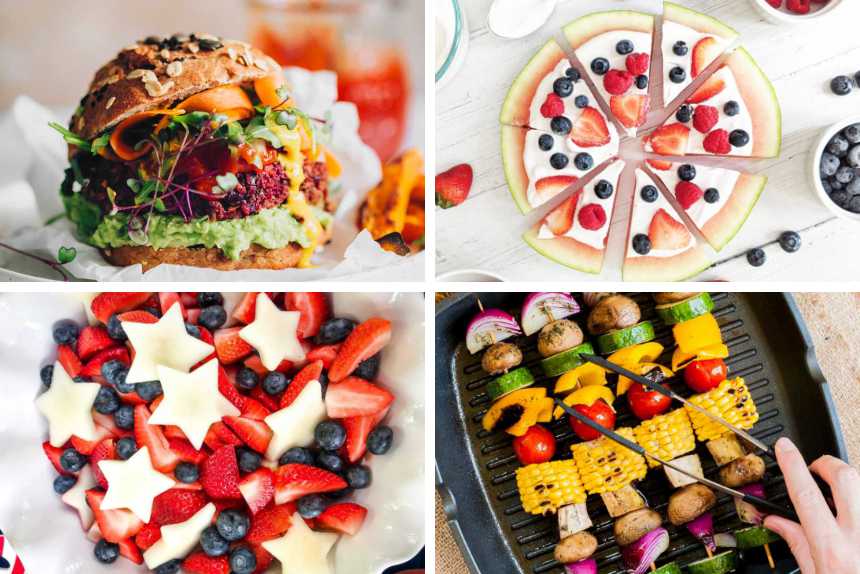




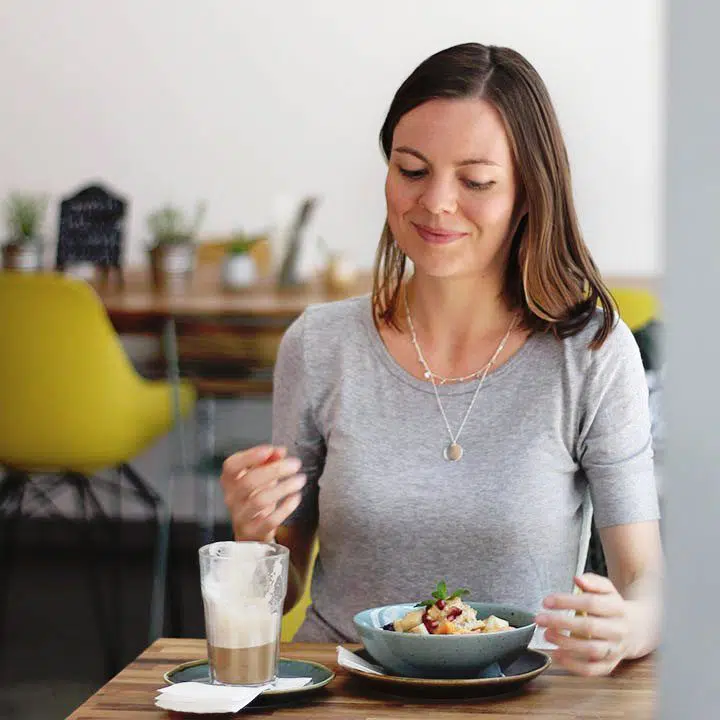
 Alena Schowalter is a Certified Vegan Nutritionist who has been a vegetarian since childhood and vegan since 2012. Together with her husband, she founded nutriciously in 2015 and has been guiding thousands of people through different transition stages towards a healthy plant-based diet. She’s received training in the fields of nutrition, music therapy and social work. Alena enjoys discussions around vegan ethics, walks through nature and creating new recipes.
Alena Schowalter is a Certified Vegan Nutritionist who has been a vegetarian since childhood and vegan since 2012. Together with her husband, she founded nutriciously in 2015 and has been guiding thousands of people through different transition stages towards a healthy plant-based diet. She’s received training in the fields of nutrition, music therapy and social work. Alena enjoys discussions around vegan ethics, walks through nature and creating new recipes.
Looking to go vegan? Our ultimate beginner’s guide lets you in on everything you need to know from non-vegan ingredients to transition tips, easy recipes, best resources, and dealing with everyday hurdles.